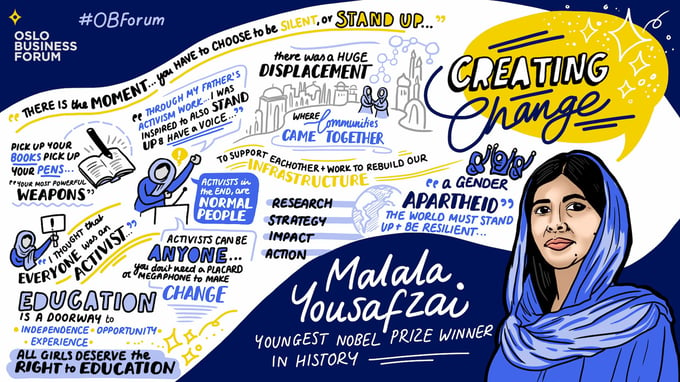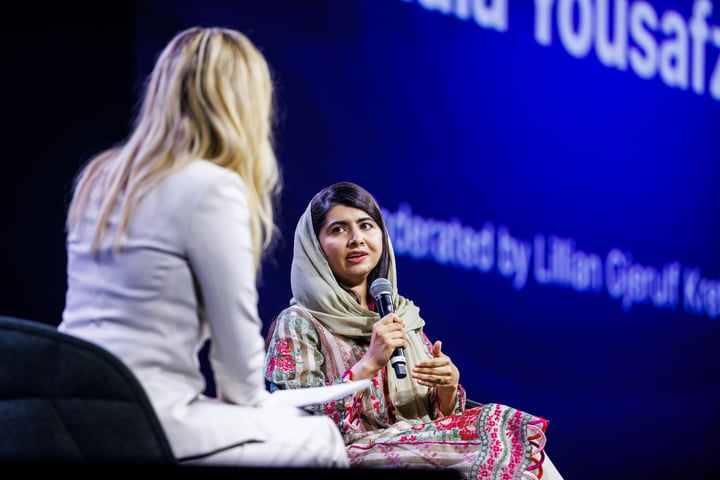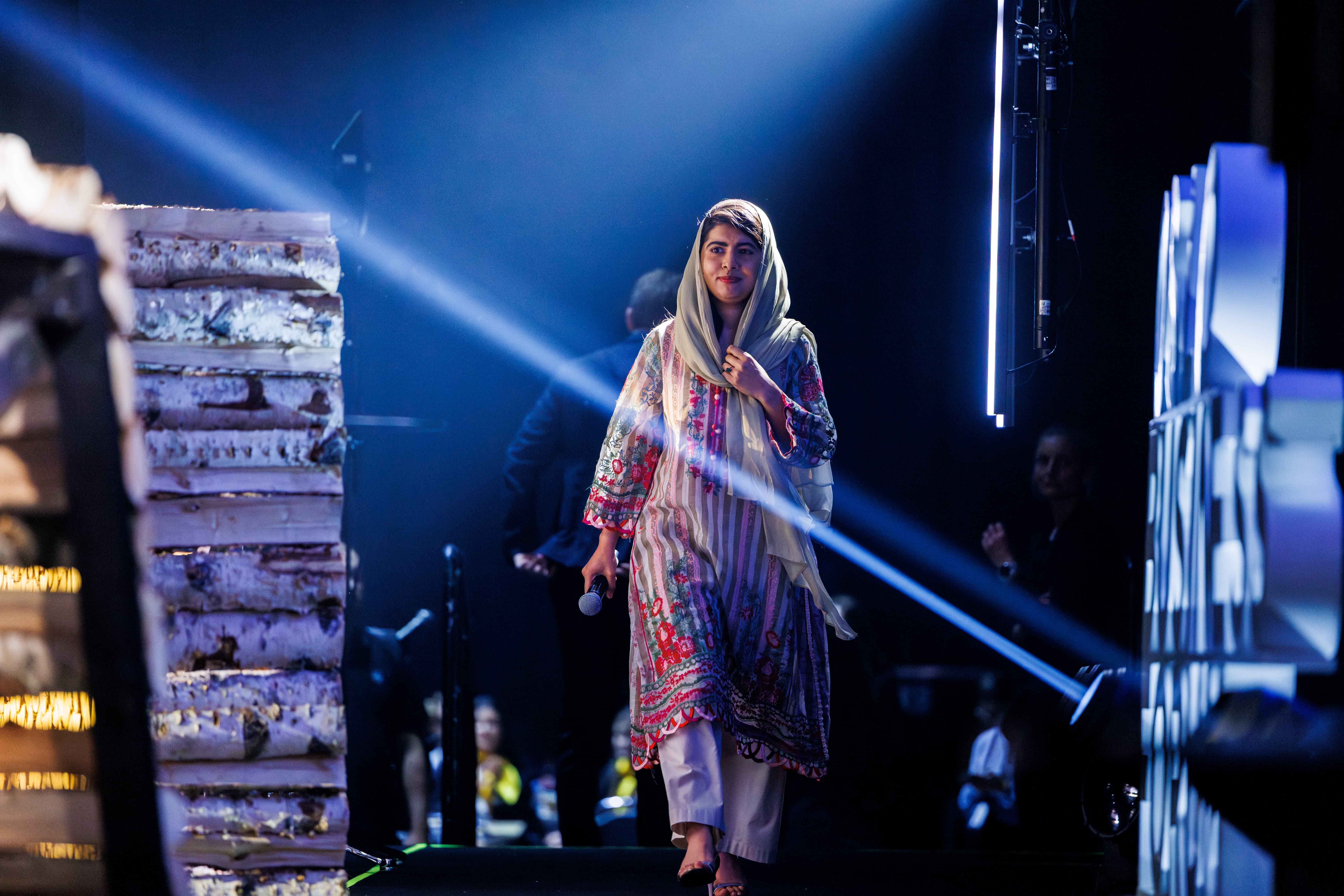In a riveting and emotional session at Oslo Business Forum, Malala shared her journey as an activist and helped leaders understand that they, too, can influence change. Malala explored defining values, finding courage, and even the importance of having a sense of humor.
As a girl, Malala loved school. But everything changed when the Taliban took control of her hometown. The extremists banned many things and enforced harsh punishments. The harshest punishment for Malala was no longer being allowed to go to school.
She advocated publicly for girls and their right to learn, and this made her a target. In 2012, a masked gunman boarded her school bus and shot her. Miraculously, she survived. In her recovery, she realized she had a choice: live quietly or speak out. She chose to fight for a world where every girl in every corner of the world can go to school.
"Let us pick up our books and our pens. They are our most powerful weapons."
In 2014, Malala was honored as the youngest recipient of the Nobel Peace Prize for her activism and advocacy for equality and education.
.jpg?width=680&height=454&name=IMG_9230%20(1).jpg)
Malala Yousafzai is an education activist and the 2014 Nobel Peace Prize laureate. She is the world's youngest Nobel Prize laureate, having won the award at the age of 17. When she first took a stand, Malala simply acted on her belief that all Pakistani girls like her had a right to education. Now, she's teaching others how to fight injustice in the world and everyday life, starting in their own communities.
Imagining Impact
As a girl, Malala did not imagine the impact she would make on girls across the globe. "All I knew when I was young is that I had a responsibility," she said.
Malala recognized the issues in her community and country and felt compelled to act. "I did not consider it a job or profession," she said. "I thought everyone was an activist."
When she first spoke out, she had just one goal: to be in school.
She knew that many girls in Afghanistan did not have access to education because of cultural beliefs and a lack of infrastructure and facilities. "Growing up in a patriarchal society, opportunities for girls are very limited," she said. Despite this, she never imagined a day when girls would be banned from school.
When the Taliban deprived her of this basic human right, she thought, "I have no option. I have to make this change happen."
Activism may be embedded in Malala's DNA. Her father was a vocal activist, willing to speak out about the injustices in Afghanistan. Malala recalled that when cameras were put in front of him, he would speak the truth loudly and openly. "I wanted to do the same," she said.
"I had my story of truth. And when people hear my story, they realize what the Taliban did was unjust."
Journalists from news outlets around the world were eager to share stories from students, teachers, and local communities. At first, her father encouraged her to be careful and not to name the Taliban. "I thought we should not carry any fear by pointing the finger at those causing the atrocities," she said.
She and her father participated in peace walks, radio and television interviews, and documentaries. Just 11 years old at the time, Malala knew nothing about activism—but she knew something was not right. "I did not know what I was doing, but I knew I had my story," she said. "I knew something was unjust in this story, and it needed to be heard."

Defining Values and Finding Courage
Our values define us and propel our call to activism. Malala encourages leaders to let their values guide them in making decisions, just as she has allowed her values to lead her to action.
"Cause no harm, respect all individuals, contribute to more harmony."
"We know who we can call 'truthful' or 'kind' or 'trustworthy.' What has helped us to see that is how they have translated their values into action," said Malala.
When Malala was attacked by the Taliban, their mission was to silence her voice. That mission failed and did not leave her frightened. When asked how she found the courage to speak out, Malala said, "It became a life mission to me."
Her activism journey has been fueled by hope and optimism. Activism is a difficult journey, but Malala wants people to know, "Any one of us can be an activist in any role we take in our community."
"An activist can be anybody, in any place right now, raising their voice and highlighting something that people have never heard of."
Receiving the Nobel Peace Prize
Proving that anyone can be an activist and be honored at the highest level for their efforts, Malala received news of her Nobel Peace Prize while she was sitting in chemistry class. She was thrilled to hear the news and discover who she would share the prize with.
Malala received the Nobel Peace Prize alongside Kailash Satyarthi, a social reformer who campaigned against child labor in India and also advocated for the universal right to education. "I was glad that the prize was, in a way, given to children that year," she said. "What was important for me was to take this moment and remind everyone that this is a serious issue we all need to fight for. Since then, I have been even more determined to keep my work going."

Creating Change
While Malala has witnessed significant change in her country since the start of her activism, she has also seen setbacks.
"It was a dark period in the history of Afghanistan when the country fell to the Taliban again," she said. "I knew the reality of women's lives would be completely different in no time."
When the Taliban regained control, activists made their voices loud and clear—but many people still have not heard those voices. "The last few years have shown us that there is no concept of equality under the Taliban," Malala said. "It has been two years since girls have seen their classrooms. The U.N. and other international organizations have called it a gender apartheid."
"This is a moment that should wake everyone up and unite for protecting human rights," she said.
Malala believes military presence is never a solution. She says that what creates change in a community is when we strengthen, invest in, and empower people. And while every voice matters, Malala sees some of the greatest change when women are active and participating.
"Even with little successes, we have seen how women are making their voices loud and clear," Malala said. "The resilience and courage of the Afghan women give me hope for the future of the country, and we can bring an end to this gender apartheid."
Where to Start
One mistake that first-time activists often make is believing activism begins with a big, strategic plan. But when we look at major movements in history, most started with small actions by individuals or small groups.
When Malala first became an activist, she said, "I had no idea what was happening outside my hometown. All I wanted was for my friends and I to get access to our education."
"Often, big impacts start out with small gestures."
Slowly, she saw others were supporting her story and realized it was not just the girls in her hometown who did not have access to education. "I took it from a small action to a big action to make this change happen for other girls, as well," she said.
She talked about the approach used at her organization, Malala Fund. The fund supports education activists who are already leading the work in other countries, providing them with the tools they need to advocate more powerfully and see their impact more quickly. Malala Fund began with small steps and has grown to support more than 100 activists in eight countries doing incredible work to influence legislation and the quality of education.
Four-Step Advocacy Cycle
The greatest takeaway from Malala's session may be the four-step framework she shared for creating change: research the issue, build a strategy, take action, and create an impact right where you are.
1. Research: Before embarking on your activism, understand exactly what the issue is. Gain knowledge about where it originated and what is contributing to it.
2. Strategy: Developing an activism strategy requires you to determine your strengths, which will guide you to your special role in addressing the issue. Remember, however, that you can't do it alone. Working with others can help you chart a course towards great impact.
3. Action: Taking action should be a collective effort. Determine your key partners in this mission and collaborate with them to activate change.
4. Impact: As you work towards your ultimate goal, there will be moments to celebrate on your activism journey. Assessing the impact you've made so far will help you determine how to accelerate your work or find more creative ways to address the problem.
When asked how this cycle can help leaders get started, Malala said, "It looks simple initially, but when you get started, it can be challenging. Realize what is unique about your position and that you don't have to do everything alone."
Malala pressed business leaders to ask themselves, "What can we do internally for the people who work for us, and what can we do outside?" You may be able to help organizations working for the same cause by contributing funding, training, or volunteer time. "Figure out the best way to give back to the people who are doing the work on the ground," Malala encouraged. "You know best how to use your resources and skills to support your community."
Acknowledging again that the journey can be challenging, Malala offered words of encouragement to leaders at Oslo Business Forum: "Keep your dreams big, don't lose that optimism in your life, and keep moving forward."
Imagine the Role You Can Play
Malala closed her session by offering leaders in the room practical and actionable advice. "My advice to everyone is to think about what role you can play as an activist in your capacity," she said. "And always begin with your role at home."
She reminded leaders that you cannot wear that face of activism for just one moment; you must make it part of yourself wherever you are, wherever you work. The change you want to see must be reflected in all the work you do.
"I hope you will work for the causes that you believe in and help me in ensuring a world where girls can have access to complete, quality, and safe education," Malala said.
Key Points
- Our values define us and propel our call to activism. Let your values guide your decision-making.
- Activism is a difficult journey, but anyone can be an activist in any role we take in our community.
- Activism rarely begins with a big, strategic plan. Start small.
- Malala's Four-Step Advocacy Cycle can help leaders and their organizations create change: research the issue, build a strategy, take action, and create an impact.
- Imagine the role you can play as an activist in your current capacity, and begin with your role at home.
Questions to Consider
- How do you define your values? How do they guide you in making decisions and solving problems?
- Which lessons can you take from Malala's story to instigate and navigate change in this disruptive world?
- Do you have a story that others need to hear? How can the Four-Step Advocacy Cycle jumpstart your activism?
Want to be a part of the OBF community? Join Oslo Business Forum 2024: Courageous Leadership now!
